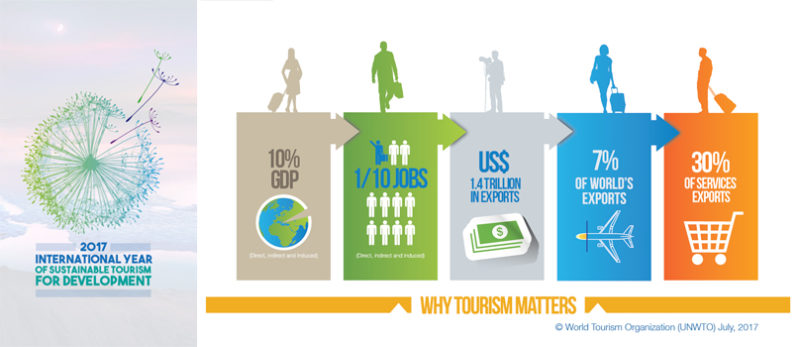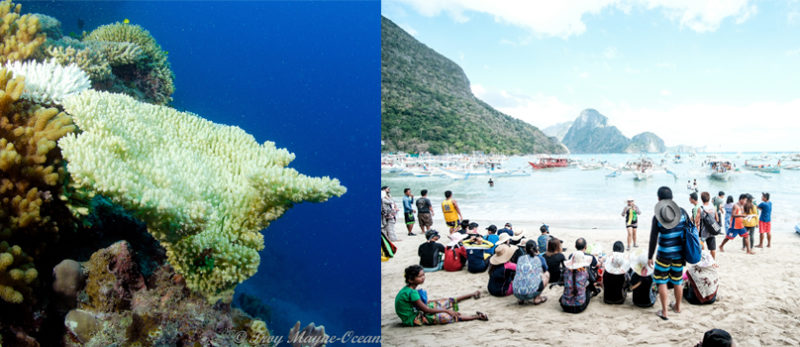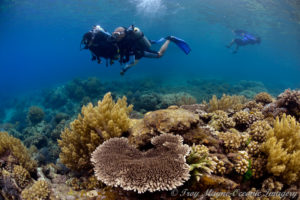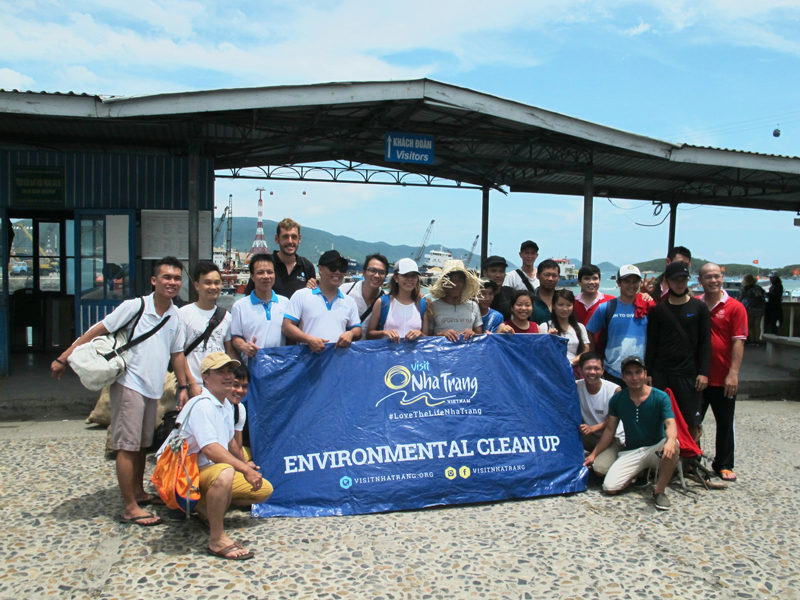This year, 2017, was the International Year of Sustainable Tourism for Development. What does that mean and what has Reef-World done to advance the cause?
What is the International Year of Sustainable Tourism for Development?
The United Nations (UN) declared 2017 as the International Year of Sustainable Tourism for Development. It presented a unique opportunity to explore and highlight tourism as a driver for positive change, from economic growth to reducing poverty and promoting cultural values. Tourism is one of the largest and fastest-growing socio-economic sectors of the world. In fact, according to the World Tourism Organization (UNWTO), international tourist arrivals worldwide are expected to increase by 3.3 percent a year between 2010 and 2030 to reach 1.8 billion by 2030.
Many of these tourists will be divers and snorkelers visiting the world’s most beautiful coral reefs. With approximately one million newly certified divers each year, dive-tourism industry can stimulate economic growth, and create decent jobs and business opportunities. Read on to learn about the Green Fins initiative and how it helps dive operators and dive tourists contribute to the sustainable development of the diving tourism sector while safeguarding ecosystem quality.

How does sustainable tourism relate to the diving industry?
While the rapidly expanding dive industry represents a big economic opportunity, it also brings environmental risk. As more divers certify each year, the ecological pressure on the marine environment increases. Due to its strong reliance on healthy and attractive coral reefs, the dive-tourism sector is particularly vulnerable to the impacts of climate change. Many famous dive destinations are quite remote, and many divers are willing to invest significant time and money to reach them. But no reef-based diving industry will survive in locations where coral reefs are smothered with algae, the surface of the water is polluted with marine debris, and all the marine life is gone. Because of this, a healthy and sustainable business depends on a healthy ocean.
What risks do coral reefs face?
Unfortunately, 95 percent of the world’s coral reefs are at risk. This means the list of global threats keeps growing and growing. Of course, climate change is on the top of the list. The Earth’s temperatures are rising and both 2016 and 2017 continued to break heat records. Throughout 2017 there have been more frequent and stronger storms. Increasing temperatures lead to melting ice caps and rising sea levels. Additionally, the ocean is getting more acidic. This makes it even more difficult for corals to survive. Overfishing, illegal and unreported fishing (IUU), pollution and habitat loss are some of the other major global problems. Although this can seem overwhelming, the diving industry can become an important driver of change.

Dive-related threats to the reef are often overlooked. The more diving tourists and businesses there are, the higher the pressure on the local ecosystems. By removing threats we can control — such as waste, anchoring, direct diver damage and chemical discharge — we help the reefs stay more resilient in the face of global risks.
Use Green Fins to drive change

How can you as an individual make a difference? Whether you are a dive tourist, dive center manager or a dive guide, Green Fins has a whole suite of tools to help you dive for change. For more than 10 years, the initiative has worked toward the creation of a sustainable diving and snorkeling tourism industry. It now encompasses an international network of over 500 dive centers. For Green Fins divers, every year is the year of sustainable tourism.
The backbone of the initiative is the Code of Conduct: 15 points that highlight sustainable business and diving practices both above and below the water. Dive centers and divers who follow this set of guidelines are consciously working toward the survival of coral reefs.
Tourists also play a key role, especially in creating a demand for sustainable diving and snorkeling practices. In the end, the tourist keeps the industry going. The decisions you make every time you plan a trip have a big impact on the direction of the industry.

Here some tips on how divers can make a difference:
- When planning a trip, choose dive centers that are working toward coral-reef conservation. Let them know why you chose them and confirm that divers value their commitment. There are more than 500 Green Fins members in eight countries: Thailand, Malaysia, Singapore, Indonesia, The Philippines, The Maldives, Palau and Vietnam. Find them all here.
- Next time you go diving, consider tipping your guide for their environmental positivity, especially if they gave environmentally focused dive briefing or showed exemplary underwater role model behavior by picking up trash or correcting bad behavior. Let them know you approve, and you will go a long way to reinforcing that behavior.
- Follow the Green Fins diving and snorkeling best practices:*Don’t step on or kick coral. Divers and snorkelers can easily break coral with their feet or fins, which can injure or kill coral reefs.
*Don’t stir the sediment. Careless divers and swimmers who stir up the sand can cause damage to coral animals and ruin the beauty of the reef. Practice your buoyancy skills and maintain your distance from the reef.
*Don’t touch or chase marine life. This can lead to stressed and scared animals that will swim away, leaving nothing to see. Touching coral will often spread diseases and cause damage.
*Do not buy corals or marine life as souvenirs. This encourages people to remove tons of marine life, dead or alive, from marine ecosystems to sell as souvenirs. Many of these species play vital roles in maintaining healthy reef ecosystems. If the buying stops, the collecting can too.
*Do not feed the fish. This can make fish sick or aggressive, causing them to attack and injure humans. It can even lead to algae smothering corals, as the fish are no longer controlling the populations of their natural food sources, like algae.
*Do not litter. There are many problems with marine pollution, ranging from animals eating plastic bags and cigarette butts to chemicals in the waste, contaminating the water and entering the food chain. Reduce your plastic footprint and encourage recycling and correct disposal in appropriate receptacles.
*Practice buoyancy control and photography skills so as not to cause damage and disturb the environment. Do not place cameras on reefs or move marine life to capture a better shot.
*Inspire others. Word of mouth is one of the best ways to change behaviors. If you have gone diving with a Green Fins dive center and you’d like to share that experience with others, tell those close to you. They value your opinion and you may find an opportunity to be a driver of change. Be an active Green Fins diver; use social media as a tool to spread the word and be part of the community.
- Inspire others. Word of mouth is one of the best ways to change behaviors. If you have gone diving with a Green Fins dive center and you’d like to share that experience with others, tell those close to you. They value your opinion and you may find an opportunity to be a driver of change. Be an active Green Fins diver; use social media as a tool to spread the word and be part of the community.
- If you run a dive center in an active Green Fins country, consider becoming a certified Green Fins member. Training, assessment and annual certification by qualified Green Fins Assessors are all free. Even if you are not in an active Green Fins location, you can buy the Dive Center Operational Handbook for $25 from The Reef-World Foundation. We’ve included over 10 years of best practice from the industry in this step-by-step guide to reducing your dive center’s environmental footprint. A wide variety of environmental awareness raising materials is available for free on the Green Fins Downloads page. The YouTube page will lead you to a variety of “How-To” videos with tips and tricks, ranging from responsible waste-management practices on the boat to how to manage underwater photographers.
With the right policies in place, diving can contribute to ecosystem preservation and biodiversity and help protect natural heritage. By adopting environmental best practices, sustainable tourism becomes the standard in the diving industry. Remember that nature and economy go hand in hand and that a healthy ocean directly translates into a healthy and thriving business and community.

